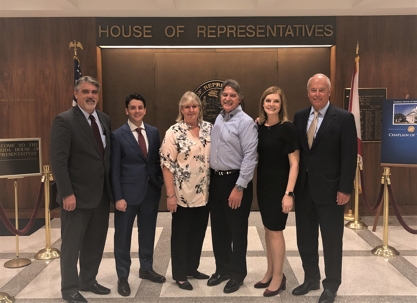In one of the greatest victories in the anti-hazing movement’s history, Governor DeSantis has signed "Andrew's Law," a bill drafted by our own Attorneys David Bianchi and Michael Levine to better protect the victims of hazing. In partnership with Senator Lauren Book and Representative Chip LaMarca, our firm advocated for this bill through numerous committees in both Florida legislative chambers, winning bipartisan support over the last several months. Now, we're proud to say that “Andrew's Law,” an amendment to the original "Chad Meredith Act” is now the law in Florida.
“We knew that we needed to make our good law even better,” said Attorney David Bianchi, who was also one of the original architects of the “Chad Meredith Act” following his representation of Chad’s parents, who successfully sued those responsible for Chad’s hazing death at the University of Miami.
"Andrew's Law" Shows the Way Forward for Anti-Hazing Legislation
“Andrew's Law” is named for Andrew Coffey, an FSU student who died in November 2017 during a fraternity hazing tradition. As a pledge, he was given the “family bottle” of bourbon by his big brother and was expected to drink the entire bottle which he did. He died hours later of acute alcohol poisoning and no one called for help even after it was obvious that he was in extreme distress.
Our amendment to Florida's existing anti-hazing statute is designed to address the problems that led to Andrew Coffey's death and the subsequent investigation into what happened. “Andrew's Law” provides immunity from hazing prosecution to the first person to call 911 on behalf of a hazing victim as well as to anyone rendering assistance to the victim while waiting for the 911 response. To be eligible for the immunity one must stay on the scene, cooperate with the police and fire rescue and provide whatever information is asked for.
Additionally, Andrew's Law strengthens Florida’s existing hazing statute by:
- Making fraternity and sorority officers who planned the event but may not have personally attended the event criminally liable for hazing; and
- Making it a crime to haze, not just a fraternity or sorority pledge and existing member of a fraternity or sorority but a former member as well.
Granting immunity incentivizes students to remain vigilant of hazing and call for an ambulance as soon as there's a medical emergency. Forcing the 911 caller to cooperate with police also ensures that the people responsible for the hazing incident are held accountable in court.
"If one of the kids from the party that night—there were 90 kids there—if just one of them would have picked up the phone when they saw that Andrew needed some help, he'd still be here," Andrew’s mother Sandy said to lawmakers during hearings on the bill. The Coffey family, whom Mr. Bianchi and Mr. Levine represented during their civil suit against Pi Kappa Phi and 12 other defendants, have been vocal supporters of the new legislation.
Our firm is proud of the countless hours of research, drafting, and other efforts that David Bianchi, Michael Levine, Senator Book, Representative LaMarca, President John Thrasher at FSU and the Coffey family poured into “Andrew's Law”. Thanks to their work, generations of Florida college students are better protected from hazing and the damage it causes. Our sincerest thanks go to Tom and Sandra Coffey, whose bravery and relentless advocacy made this law possible. In Andrew's memory, we have helped to make college campuses in Florida safer for future students.

